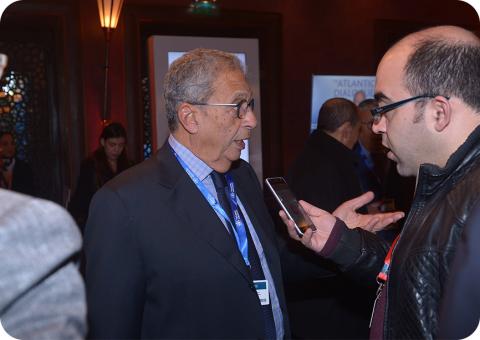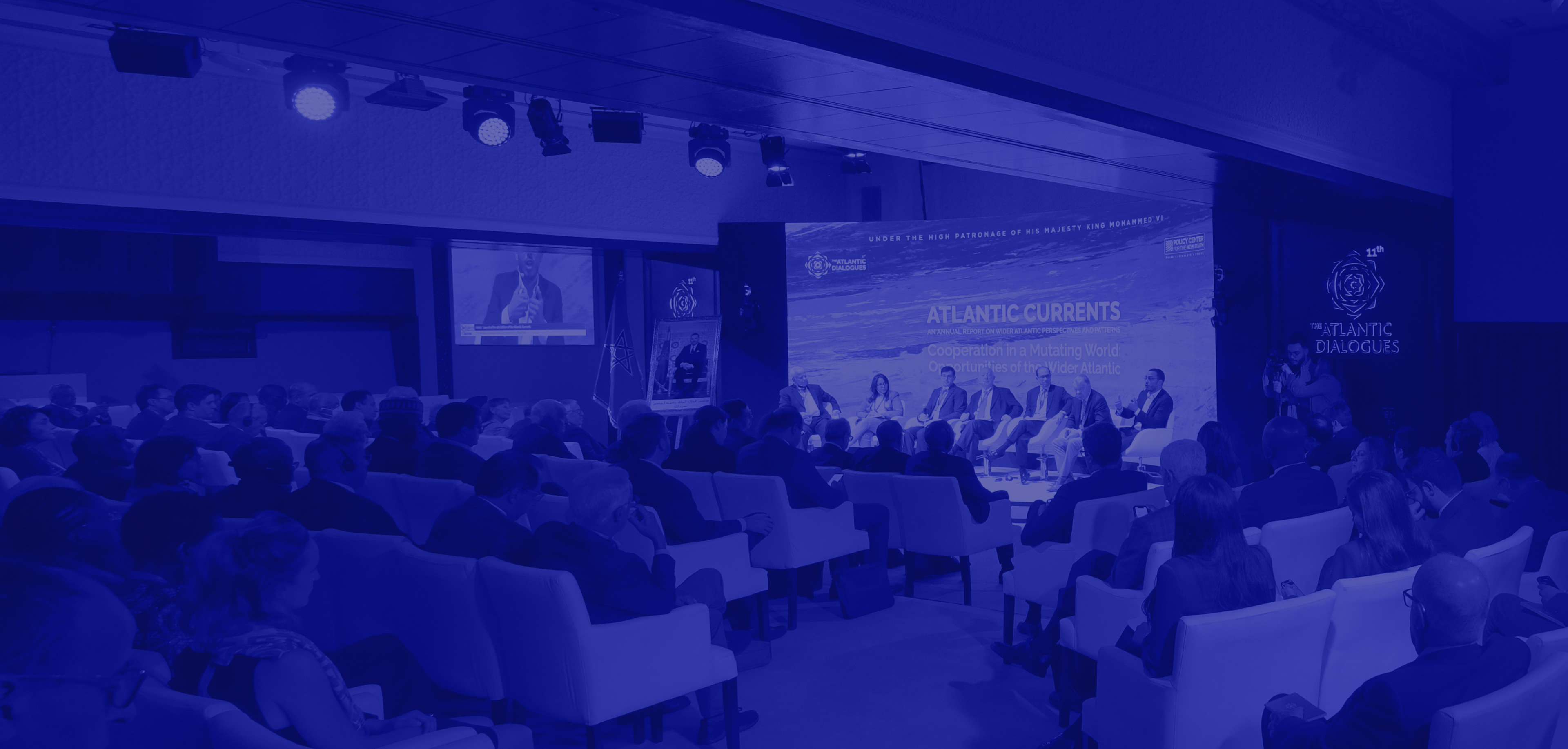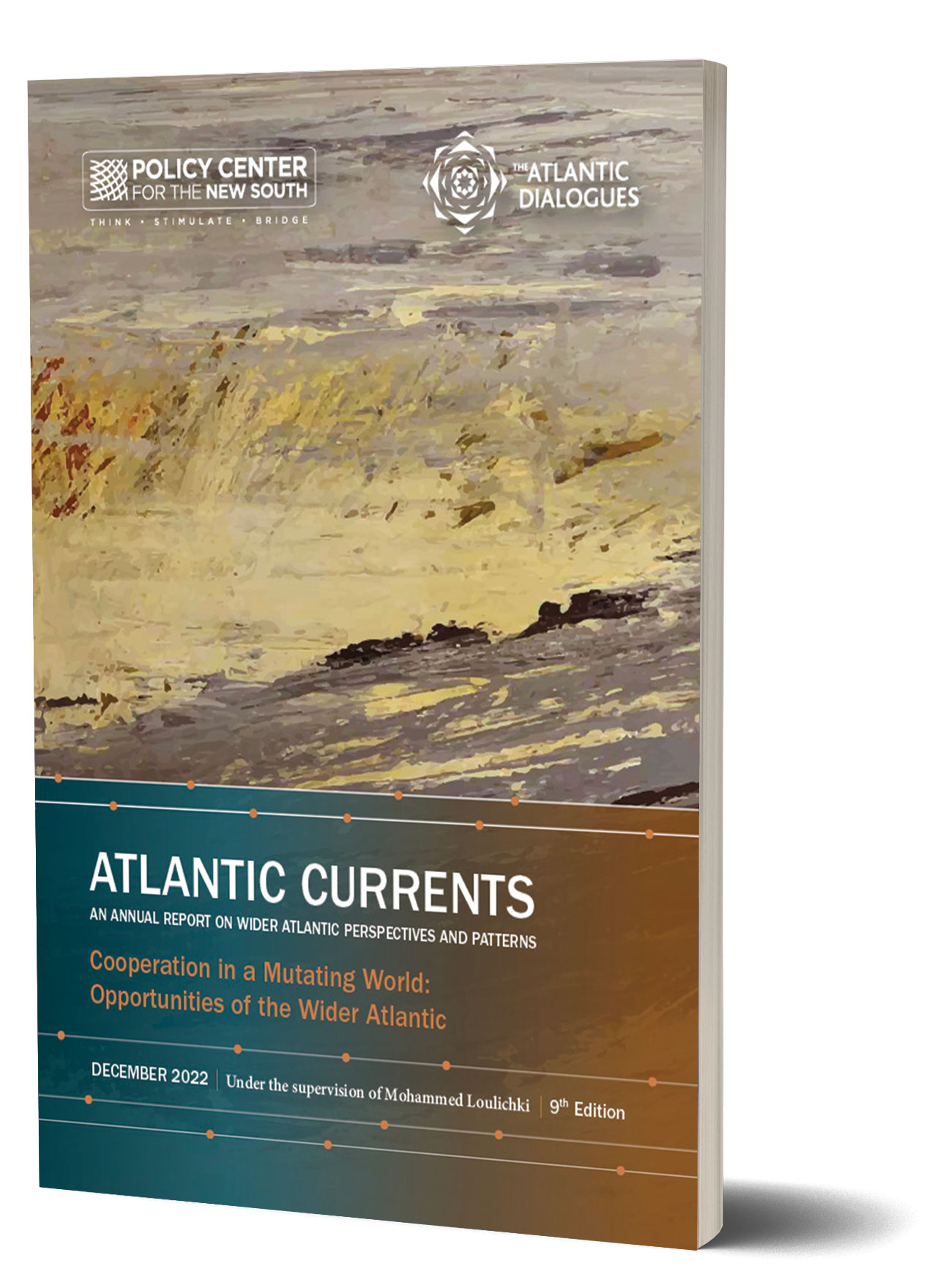
This ninth edition of “Atlantic Currents” appears in an international context marked predominantly by a ten month-war between Russia and Nato members that began February 2022. The war is affecting not only


14-16
December, 2023
Marrakesh, Morocco
The Policy Center for the New South will be holding the 12th edition of The Atlantic Dialogues, its annual high-level international conference, from December 14th to 16th in Marrakech, Morocco. The Atlantic Dialogues is an annual high-level gathering of influential public and private sectors leaders from around the Atlantic Basin for open, candid and informal discussions on cross-regional and cross-sectoral issues.
Launched in 2012, The Atlantic Dialogues have reached a milestone since they have been running for over a decade. The initial vision was to underscore the growing importance of Africa and Latin America as actors in the Southern Atlantic space by transforming mindsets, mental maps and narratives. Many editions that ensued have addressed key strategic issues with over 400 participants each year from Africa, Latin America, Europe and North America, former presidents and ministers, representatives of major institutions, CEOs, experts and seasoned African, European and US journalists to anchor the panels.
Following the discussion in 2022 on “Cooperation in a Mutating World: Opportunities of the Wider Atlantic” to explore renewed collaboration in times of crises, the AD community will convene again to reflect on what assertiveness can mean for the Atlantic, and what a more assertive Atlantic can mean for the world. To this end, the 2023 edition of the conference will focus on the following theme, "A More Assertive Atlantic: Its Meaning for the World”.
The idea of a more assertive Atlantic is at the root of a number of economic, political and security trends that have the potential to significantly impact on the world. A deeper understanding of the meaning and potential implications of this new perception of the Atlantic Basin is needed, as it marks a shift in the dynamics of the region. Understanding this phenomenon requires exploring different perspectives from Africa, Europe and the Americas.

This ninth edition of “Atlantic Currents” appears in an international context marked predominantly by a ten month-war between Russia and Nato members that began February 2022. The war is affecting not only
After decades of economic integration, the world seems to be fragmenting again, epitomized best, perhaps, by the return of geopolitics, protectionism, unilateral sanctions, treaty withdrawals, and even military and economic coercions. The war in Ukraine seemed to further deepen this impression of a suffering international order especially in the Wider Atlantic, where a difference of views divides the West and the global South. Concomitantly, institutions of multilateralism, such as the United Nations and its manifold agencies, have been criticized for their lack of efficiency and their institutional sclerosis. They have, additionally, been challenged by the global South, notably the African continent, for their unfair governing structures with increasing pressures to add two African seats to the Security Council. Unlike countries of the northern Atlantic, the southern Atlantic still lacks mechanisms of effective collaboration and the willingness to align positions on the international scene.
- How can we bridge the gap between positions and posture between the global South and the global North?
- Is the Wider Atlantic a viable space for cooperation and dialogue between states?
- Is multilateralism in need of a global reform? What is the role of the global South in this overhaul?
Since 2020, the international community has been witnessing seismic changes in several spheres. COVID-19 has disrupted global production and its supply chains. The war in Ukraine has sparked an energy crisis, induced food insecurity, resulting in acute effects for the most vulnerable. The multilateral system has been profoundly challenged, and climate change and nuclear war threats are on the table. In the context of these compounded crises, the Wider Atlantic has emerged as a crucial element of geopolitical and geoeconomic analysis in world affairs. The session will discuss the prospects of cooperation in the Wider Atlantic that would make it possible for states to collectively tackle common issues. It will also investigate the extent to which such cooperation might shift the gaze from Asia and the Pacific into a Wider Atlantic.
- What are some of the features characterizing the impacts of these compounded crises?
- What are the security, political and economic drivers of the Wider Atlantic—being at the intersection between the Americas, Europe and Africa—in the current global context?
- Would a Wider Atlantic unified strategy be useful as an attempt to quell the crisis?
- What is the role of Africa and Latin America in (re)shaping the Wider Atlantic dynamics?
This session will present and discuss the 9th edition of Atlantic Currents report, one of the flagship annual publications of the Policy Center for the New South. This report comes along with the high-level Atlantic Dialogues conference and explores key global issues facing the Atlantic from a Southern viewpoint.
In line with the theme of the Atlantic Dialogues Conference, this 9th edition will be devoted to “Collaboration in a Mutating World: Opportunities of the Wider Atlantic”. It will analyze the political, economic, social and security developments reshaping societies and relationships in the Atlantic Basin as well as the opportunities they present for further cooperation and common strategies.